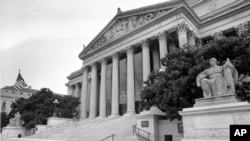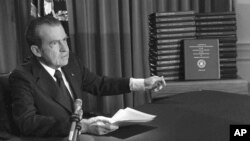The circumstances surrounding Monday’s FBI search of former U.S. President Donald Trump Mar-a-Lago estate in Palm Beach, Florida were not immediately clear, according to media reports. However, the Justice Department has actively investigated the discovery of boxes containing classified information that were taken to Trump's Florida residence after he left the White House in January 2021.
Why are the call logs, drafts, speeches, handwritten notes and other documents from Trump’s term in office in the possession of the National Archives?
“Presidential records are the property of the United States government and are administered by the National Archives,” said Meghan Ryan Guthorn, acting deputy chief operating officer of the agency. “So, all presidential papers, materials and records in the custody of the National Archives, whether donated, seized or governed by the Presidential Records Act, are owned by the federal government.”
The Presidential Records Act of 1978 established that all presidential records are owned by the public and automatically transfer into the custody of the National Archives as soon as a commander-in-chief leaves office. All presidential libraries and museums are part of the National Archives. Former President Barack Obama’s presidential library will be the first to be fully digital.
“The National Archives and Records Administration is the official record keeper for the United States government,” Ryan Guthorn said. “Only about one to 3% of the records are considered permanent records, and those are the documents that are essential to understanding the rights and entitlements of U.S. citizens, that hold our elected officials accountable for their actions, [and] document our history as a nation.”
Presidential records weren’t always owned by the public.
“From George Washington through Jimmy Carter, the papers of a presidential administration were considered the private property of a president to do with as they saw fit,” Ryan Guthorn said.
Most commanders-in-chief have donated their presidential papers, a precedent started by President Franklin D. Roosevelt in 1940. That continued until the 1970s when President Richard Nixon fought to destroy his records, including secret tape recordings, during the Watergate scandal that eventually led to his resignation from office.
Congress suspected the tapes contained evidence that could incriminate the president. Lawmakers passed the Presidential Recordings and Materials Preservation Act of 1974, which applied only to Nixon’s presidential materials and instructed that materials related to Watergate be retained by NARA.
During his lifetime, Nixon fought to keep his presidential records private. NARA received most of the recordings related to Watergate, but not all. After Nixon’s death, his family donated his presidential papers and other materials.
“Julie Nixon Eisenhower calls me, said she wanted to meet with me, said the family wanted to settle,” says John Carlin, who served as archivist of the United States from 1995 until 2005.
Nixon’s daughter reached out to Carlin during his first week on the job in June of 1995, more than 20 years after Watergate.
“You have to remember that in those days, the president's records were personal,” Carlin said. “Nixon was going to keep them, and he had the law on his side. … And so, when she called that day and said, ‘We're ready to settle,’ that was good news. … When he [Nixon] was alive, he fought it. I mean, tooth and toenail. There wasn't going to be any settlement.”
Among those who access White House records are presidential scholars like Shannon Bow O’Brien who are interested in documenting history.
“The public can start making requests through the Freedom of Information Act five years after an administration ends, but also the president can invoke certain restrictions for public access for up to 12 years,” said O’Brien, a professor in the government department at The University of Texas at Austin College of Liberal Arts.
“If we don't have access to this material, we don't have access to the truth. We only have access to curated truths, in many ways, which is what people want to tell us, or what people want us to see, and that's not always the most accurate.”








